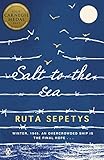
Price: £8.99
Publisher: Penguin
Genre: Fiction
Age Range: 14+ Secondary/Adult
Length: 400pp
Buy the Book
Salt to the Sea
‘Suffering emerged the victor’ writes the author in a brief epilogue to this epic story set in the closing days of the Second World War. Its theme is the worst disaster in maritime history and still the least discussed. On January 30, 1945, nine thousand passengers, many of them refugees including five thousand children, converged on the German ship Wilhelm Gustoff moored off the East Prussian coast. Sailing out grossly over-laden but still leaving many behind also desperate to escape the advancing Russian armies, it was torpedoed shortly afterwards by a Soviet submarine. Only a few survived, and in this fictional recreation of those horrific times these include three of the book’s main characters.
Told as if from four different voices, this fine novel pulls no punches. In their journey to the coast, the mostly young main characters pass through what must often have seemed like hell on earth. Crying unaccompanied children, bitter cold, no food supplies and constant harassment from the air all go to make up an unforgettable picture of civilised life in melt-down. The little group that gets together at the start of the story provides some support to its members, yet each of them has a secret too shaming to share but impossible to put aside. Within all this misery and privation there are still acts of charity and kindness from a dedicated young nurse and an aged cobbler who takes one lone small child into his care. A fourth voice is provided by Alfred, a pathetic, deluded young Nazi, despised by his peers and a hero only to himself. His imaginary, self-aggrandising letters to the girl he fancied but who in fact hates him provide some black humour in this otherwise harrowing tale.
But Ruta Sepetys is a good writer as well as a dedicated researcher into what happened during those dreadful times. Her story is skilfully compiled and utterly convincing save perhaps for a couple of twists before the end. The concentration on the appalling conditions some children had to live through is sadly topical. And the message of hope, however guarded, that still gets through by the end is all the more welcome for being so very hard earned.



